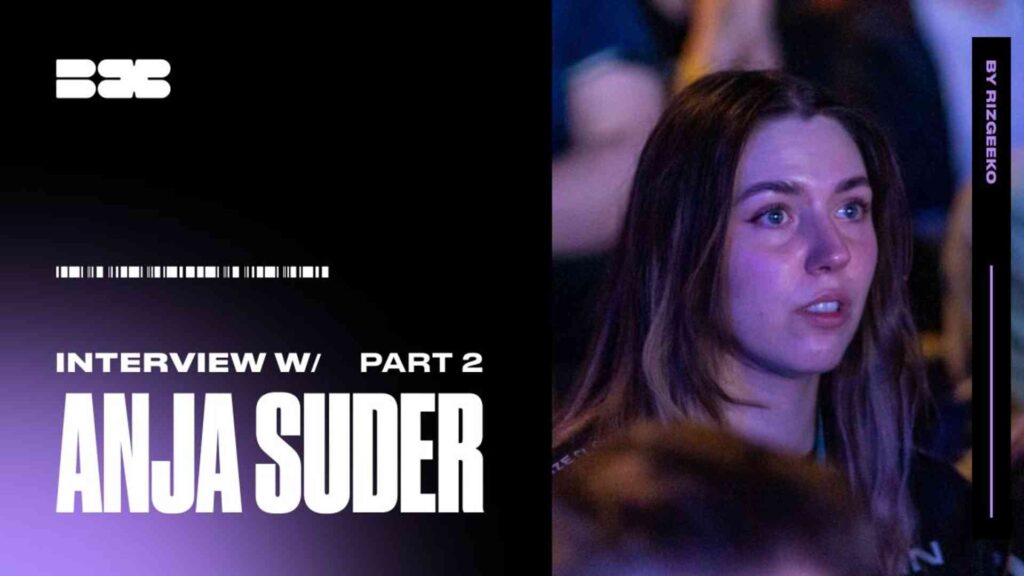We continue our insightful interview with Anja Suder, digging deeper into the esports psychology. Our first part included a general overview of the subject, including the psychological issues professional esport players face, managing their impact and integrating support into their training programs.
In this next part, Anja talks us through some important in-game aspects: tilt and burnout and coping with setbacks and losses.
BLIX: Can you discuss the concept of “mental game” in esports? What are some of the mental skills that esports athletes need to develop and maintain?
Anja Suder: Winning is a combination of physical and mental. Although your body can be present on the stage or you are virtually on the server, the mental aspect must be in sync – the ability to stay focused and be fully present in the here and now. To have a strong mental game, a good path is to self-reflect upon who you are, understanding your values, strengths and areas for improvement.
BLIX: The concept of “tilt” is well-known in esports, and can negatively impact performances. How can players recover from tilt, especially on the biggest stages?
Anja Suder: Let’s get back to those thoughts and emotions that hit you when you’re into something that really matters. It’s no surprise that esports athletes sometimes find themselves being tilted. It’s not a big deal to have these unwanted thoughts from time to time. The real trouble starts when we buy into them as if they’re absolute truths, and then our actions follow suit. Think of tilt as a sign that someone’s wrestling with their thoughts and emotions and letting them call the shots. That’s when performance takes a nosedive because all you can think about are those pesky thoughts and emotions instead of nailing the moves you need to be making. Various ‘resetting’ techniques, such as deep breathing or good communication, play a factor when ‘recovering from tilt,’ and what works best differs from athlete to athlete. A counter to tilt is having poise, which is reflected by taking action based on personal values rather than reacting to emotional experiences.
What I mean by that is that sometimes, you make decisions based on feelings or thoughts. That could be to avoid peeking because you’re afraid of missing your shot or think that you’re not good enough. This can create a conflict with who you really want to be. Let’s say you want to be persevering. So, when you’re stuck in doubt and hesitation, ask yourself: “What can I do right now to get closer to being a persevering player?”
BLIX: A lot of the most popular esports are often team-based titles. How do you address communication and team dynamics from a psychological perspective? How does team cohesion impact performance?
Anja Suder: A team is like a puzzle with various pieces, each player bringing their unique ideas, dreams and skills to the table. The key is to create an environment where all these individual parts can come together and work seamlessly to unlock the team’s full potential. If we look at a game like CS:GO, where split-second decisions matter, communication has to be spot on on the server ‘ clear, concise, and focused on the most crucial information. But off the server, team communication is just as important. Here, it’s all about talking respectfully and constructively. A team where everyone is afraid of speaking their mind won’t thrive and evolve, which affects both performance and team cohesion. So, in my book, communication is one of the most important factors in building a successful team.
BLIX: Long competing hours and practicing might lead to “burnout.” How do you address burnout and ensure their overall well-being? What signs of burnout should players, coaches, and teams be aware of?
Anja Suder: With esport being a fast-paced, competitive environment, it is important to recognize the effects of long hours of practice and competition on potential burnout. Burnout comes from prolonged and excessive stress and demands without the opportunity for social support and room to breathe. The individual’s environment plays a crucial role in maintaining the mental health of esport athletes. The first step to addressing this is with open communication through regular check-ins, where players are encouraged to talk about any concerns or signs of burnout they might experience. Signs may differ individually, but some common signs are dips in performance, feeling more tired than usual, sleep issues or isolation.
‘…if we want to see players perform at a top level for a longer time, we have to look into the structure and dynamics of organizations, tournaments and team environments’¦’ ‘ Anja Suder, esports psychologist
BLIX: Losing is a part of competitive gaming. How would you help esports athletes cope with losses and setbacks, and how can they turn these experiences into opportunities for growth?
Anja Suder: Exactly as you said, it is a natural part of being a competitor. And although it is unwanted, I believe any situation provides an opportunity to learn and grow. Understanding what went wrong, why and how we can move on from it can prove a strong path to improvement, which requires a good amount of self-reflection and the ability to openly communicate in a constructive manner. Moreover, losing challenges us to adapt to different scenarios, triggers the competitive drive to overcome setbacks and contributes to our long-term development as esport athletes. As it’s a natural part of competitive gaming, we might as well get the best out of it.
Thank you for tuning into our second part of the interview. We hope it brought value and you were able to learn about the important in-game aspects that can help you in your future games.
In our last part, Anja talks about the parent’s role in helping young players with their mental health, building confidence and recovering after a loss, so don’t miss out.


